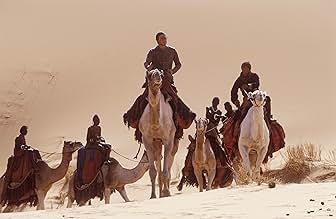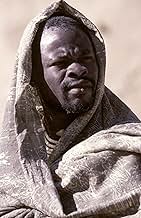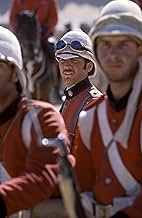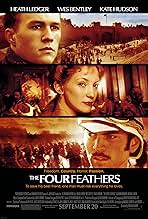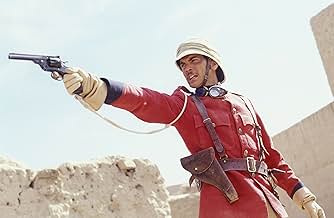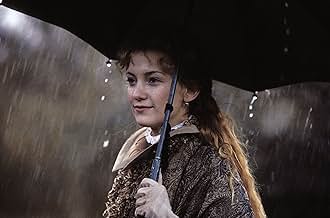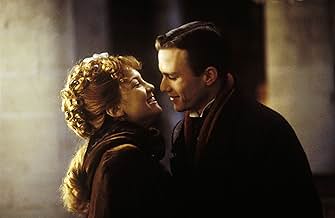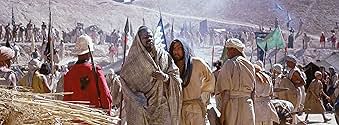Un oficial británico renuncia a su cargo justo antes de la batalla y, posteriormente, recibe cuatro plumas blancas de sus amigos y su prometida como símbolo de la cobardía que le atribuyen.Un oficial británico renuncia a su cargo justo antes de la batalla y, posteriormente, recibe cuatro plumas blancas de sus amigos y su prometida como símbolo de la cobardía que le atribuyen.Un oficial británico renuncia a su cargo justo antes de la batalla y, posteriormente, recibe cuatro plumas blancas de sus amigos y su prometida como símbolo de la cobardía que le atribuyen.
- Dirección
- Guionistas
- Elenco
- Dirección
- Guionistas
- Todo el elenco y el equipo
- Producción, taquilla y más en IMDbPro
Opiniones destacadas
While I haven't read the original novel or have seen any of the previous five filmed versions of the story and my knowledge of the history of this period is pretty much formed by movies and "Masterpiece Theatre," this is the first one done by someone born in a former British colony, director Shekhar Kapur, so I was curious to see how the natives were treated (well, more like the Pawnee than the Lakota in "Wolves").
This version also carries today's symbolic weight of Western soldiers against Muslim warriors, especially as the enemy is identified as the Mahdi -- who Osama Bin Lama proclaimed as the last glory of Islam that he aspired to replicate.
This new interpretation has Heath Ledger refusing to fight in the Sudan not because of the cowardice symbolized by the titular feathers but more in the spirit of Country Joe McDonald's view of the Viet Nam War.
I got lost a few times in the geography and rescue choreography and found Djimon Hounsou a noble African with no motivation or reason for being there whatsoever.
However, the cinematography is gorgeous and will all be lost in video. Particularly thrilling are the battle scenes, which rate up there with "Barry Lyndon." I was especially impressed that Kapur didn't keep repeating the same sight lines, as most show-off directors do about shots that must have taken hours to set up.
While crossing and re-crossing the sands didn't make a lot of sense with little explanation as to survival, the treks and fights there were lovely.
And heck, I'm a fan of the three leads, Ledger (who looks great even in a fright wig), Wes Bentley and Kate Hudson (who mostly gets to dress up and look pretty), so I just sat back and enjoyed an old-fashioned big-screen Hollywood adventure (despite the endless chatter from the row of old ladies behind me).
(originally written 9/21/2002)
Harry Faversham (Heath Ledger) is a young army officer from a distinguished military family who never wanted to join the army He did it for his father He resigns his commission on the eve of his regiment's departure for Sudan Harry has already disgusted his strict father, a respected General in the Queen's Army, by declaring no interest in a soldier's life and now that he is about to be married to his beloved Ethne (Kate Hudson), he wants to settle down
When his closest friends and fellow officers find out that he disgraced the regiment, they send him a box of feathers of cowardice When Ethne sends him another feather, he then disappears to redeem himself, to face up to his fears, to discover himself, to win back his self-respect...
Shekhar Kapur's "The Four Feathers" is beautifully filmed and performed The themes of love, honor, loyalty, friendship, trust, redemption, wisdom, true strength, and true courage are all there They made the characters entirely plausible But what truly lingers in the memory about it are the stunning sequences filmed in the Sudan and the splendid staging of several battles, showing the then standard British tactics employed in holding off attackersthe forming of squares, with riflemen deployed in standing, kneeling, firing, holding line, and keeping eye on the target These exciting scenes of combat and carnage are truly impressive
Wes Bentley, Djimon Hounsou and Kate Hudson, Rupert Penry-Jones, Kris Marshall and Michael Sheen are among the cast, their performances are great. Many performances worth your while but Heath Ledger gives us an entertaining and possibly the greatest performance of the cast. Having one well written character in a film like this doesn't really work, it's easy to not care for anyone except for the main character and it shouldn't be like that. It isn't the actors fault as they're doing everything in their power but the problem is with the writers and script, the premise and story has potential though.
It's a beautiful looking film, no point to argue there. From the sets they created to the costume department, everything looks perfect and the cinematography is also amazing. But there's something missing in the film, like there's no heart in the writing and it feels too modern and not historical accurate. Many films take liberties I know that but I believe they could have done it more accurate if the director wanted it that way. What The Four Feathers got right was the impact war has on people and they succeeded in that.
It's a war drama that has its set of flaws but don't forget the many reasons why the film is worth watching. Cinematography, acting and its action sequences are some of the reasons why I'm recommending this film.
This spectacular adventure detailing the epic feats of a brave hero contains noisy action , idealism , romance , unlimited courage , breathtaking battles and impressive outdoors . Heath Ledger as a stubborn officer is cool , Wes Bentley as his best friend is convincingly played and Kate Hudson as his girlfriend is enjoyable . Special mention to Dijimon Honsou as the corpulent helper . Sensational battle scenes made by hundreds of extras and by means of computer generator . Evocative cinematography reflecting the late 1800's and spectacular African landscapes by cameraman Robert Richardson . Appropriate and atmospheric musical score by James Horner . The motion picture was professionally directed by Shekhar Kapur . He's a costumer/epic expert , as he proved in ¨Bandit queen ¨and ¨Elizabeth I¨ and its sequel . Other adaptations about this famous story are the followings : The classic rendition by Zoltan Korda (1939) with John Clemens , Ralph Richardson and Jane Duprez ; 'Storm over the sand' (1955) by Terence Young with Anthony Steel , James Robertson Justice , Mary Ure and Laurence Harvey ; and for TV (1978) By Don Sharp with Beau Bridges , Jane Seymour and Robert Powell.
The King's Own Cumbrian Regiment is off to the Sudan to defeat the Mahdist rebels who have attacked and massacred a British garrison. But the Cumbrians are going without their erstwhile lieutenant, Harry Feversham, who has resigned his commission to avoid combat in the Sudan. His three closest friends in the regiment, understandably outraged at Harry for leaving them in the lurch, each mail him a white feather, a traditional accusation of cowardice. His fiancee gives him a fourth feather. In despair, Harry sets off to the Sudan, hoping to rejoin his friends and prove to them that he is no coward.
The first half of the movie is unbearably slow, and exasperating too. The characters don't behave like Victorians, but like high school students from the 20th century who are ignorant of the values of the society around them. Harry's fiancee openly flirts with him unchaperoned and kisses him in public. Harry, like a refugee from our own non-judgmental era, seems amazed that his cowardice is met by rebukes from everyone around him. And his initial act *is* cowardly, no matter how hard the movie may pretend that it isn't. Harry doesn't refuse to fight because he thinks the war is wrong, or because he has conflicting obligations to meet; he admits that he would not fight for anything at all. One could hardly offer a better one-sentence definition of a coward.
The fact that Harry's initial actions really are cowardly is important: it means that his adventure to the Sudan is not an effort at vindication, but at atonement. And while he does prove that he can behave bravely, he is far more successful at proving that he is a hopeless bungler. For most of the latter half of the movie, Harry just follows his friend Abou around, and everything Harry attempts by himself comes to grief from which he is rescued by Abou, usually while Harry puts Abou's own life in serious danger. This does not satisfy the viewers' thirst to see Harry atone for his earlier cowardice. Just showing that he can be brave is not enough; he can atone only by undoing the harm he caused by his earlier decision to let his friends face danger without him, and because of his incompetence it is not he who does that, but Abou. It doesn't take long to start thinking, "Who cares about Harry? I want to watch Abou! He's the only guy in this movie who has the foggiest idea what he's about!"
The word on the street was that THE FOUR FEATHERS might be undone by politically correct posturing. That is not true. THE FOUR FEATHERS doesn't have a political bone in its body. Nobody bothers to explain what the Mahdi is fighting about, or even to mention that the Sudan of the movie's era is an Egyptian colony, not a British one. Nothing in the movie suggests what difference it makes to either the British or the Sudanese whether the Mahdists win or not. To those who don't already have an opinion, it's anybody's guess who has the right of this quarrel. At the end, the movie becomes expressly apolitical. As Harry's heroic friend Jack declares, the British Tommies don't fight for a flag or an idea. "We fight for the man on our left." Actually, the movie might have benefited from more political content. For one thing, it could have clarified why Abou, one of an unidentifed "tribe of slaves," is willing to help the British, who extinguished the slave trade throughout their empire in the 19th century.
As for the production values, Shekhar Kapur should be reported to the Society for Prevention of Cruelty to Cameras for his constant torture of the focus control. He doesn't appear to understand that making everything blurry will not make him a better artist. Heath Ledger's role as Harry chiefly calls for him to cry a lot, which he does creditably. Djimon Hounsou is almost unrecognizable in his part as Abou, with a beard, a weird hairstyle, and a light coating of dust, but he has never been more charismatic; there's no doubt why the feckless Harry clings to this rock of self-confidence. Wes Bentley as one of Harry's former friends cuts a dashing figure and later does a convincing impression of disability. Kate Hudson struggles in a ludicrous role.
This movie fails on many levels, but it could have overcome any of those failures except one: the weak hero. It's not enough to make the protagonist suffer constantly to make us sympathize with him. He has to be worthy of something more than suffering in the first place.
Rating: *1/2 out of ****
Recommendation: Even action fans should skip this one.
¿Sabías que…?
- TriviaThe major fight scene is the Battle of Abu Klea, which took place on January 17, 1885. A British Desert Column of approximately 1,100 troops fought a Mahdist force of over 12,000 dervishes. The scene depicted in the film is a fictional version of the actual battle.
- ErroresIn the film, British soldiers wear scarlet tunics during the 1884-1885 Sudan campaign in the Sudan. In real life, they wore grey tunics. They wore Khaki uniforms later on.
- Citas
Jack Durrance: You may be lost, but you are not forgotten. For those who have travelled far, to fight in foreign lands, know that the soldier's greatest comfort is to have his friends close at hand. In the heat of battle it ceases to be an idea for which we fight. Or a flag. Rather we fight for the man on our left, and we fight for the man on our right. And when armies are scattered and the empires fall away, all that remains is the memory of those precious moments that we spent sided by side.
- Versiones alternativasAfter being rated R by the MPAA the film was cut for a more commercial PG-13 certification.
- Bandas sonorasThe British Grenadiers
(uncredited)
Traditional
Selecciones populares
- How long is The Four Feathers?Con tecnología de Alexa
Detalles
Taquilla
- Presupuesto
- USD 35,000,000 (estimado)
- Total en EE. UU. y Canadá
- USD 18,306,166
- Fin de semana de estreno en EE. UU. y Canadá
- USD 6,857,879
- 22 sep 2002
- Total a nivel mundial
- USD 29,882,645
- Tiempo de ejecución2 horas 12 minutos
- Color
- Mezcla de sonido
- Relación de aspecto
- 2.35 : 1
Contribuir a esta página




